Share
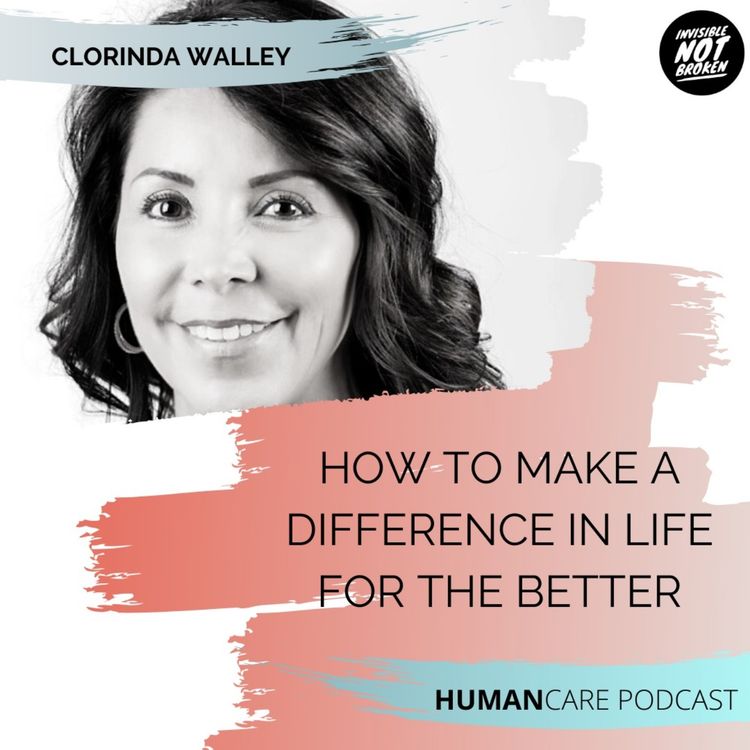
Invisible Not Broken - Chronic Illness Podcast Network
(HumanCare podcast) How to Make a Difference in Life for the Better: Clorinda Walley– Part 2
Clorinda leads the charity, Good Days, which is a national non-profit that primarily provides financial assistance to patients so that they do not have to choose between access to medicine they need and affording everyday living.
Clorinda has had more than 20 years of experience in the healthcare industry and over 12 years in strategic philanthropy. She is also a chronic illness warrior herself with ulcerative colitis, enteropathic arthritis, and more recently endometriosis and migraines.
➡️ visit www.mygooddays.org
Summary of Part 2
- Do. Do the little things. Do any thing. It will get easier.
- Good Days’ mission
- Stories of lives changed thanks to Good Days
- Developing relationships within the organization
- Climbing the wall vs coming down the wall vs there for support to catch you
** Full show notes can always be found at www.InvisibleNotBroken.com/humancare-podcast **
MORE FROM CLORINDA
What is your diagnosis(es)?
I have ulcerative colitis, entero-pathic arthritis, endometriosis and migraines.
What’s your business/initiative?
I work for a nonprofit that provides resources for life-saving and life-extending treatments to people in need of access to care
What conditions/audiences do you cater to primarily?
Chronic and Life altering Disease
Could you give us a brief snapshot of what your daily life is like? What is your “normal”?
I have had to adjust over the years since my initial struggle with Ulcerative Colitis. I am happy to say that most days now I manage well. I no longer have to take a plethora of medications and any discomfort that I have is manageable.
How has your illness shaped your career? How has it changed you overall?
I have been in the healthcare industry all of my life. Prior to becoming ill, I believed I understood what people with a chronic illness went through and needed. Boy, was I wrong! I believe the disease helped me to be a better advocate for people. Helped me to understand that when someone you love has a life altering disease it not only affects them but everyone around them. It taught me to trust, that is okay to ask for help. It taught me to listen. Most of all it had a huge impact on the responsibility I have for helping others.
What’s your latest project/post/feature that you are most excited about?
Each year on July 10 Good Days spearheads Chronic Disease Day in America. Chronic diseases account for 7 of the top 10 deaths in America. So we make the date 7/10 Chronic Disease Day (July 10th!)
We share resources and awareness because if we work together to eliminate key risk behaviors and make healthy choices, we can reduce the number of preventable chronic disease and live longer, healthier lives.
This is also a day where we bring all patient groups together to address issue that impact the entire chronic disease community, such as discrimination for insurance or ensuring basic patient rights.
Everyone can get involved. You can email us to find out if your hometown and state recognize Chronic Disease Day. If they don’t currently recognize it, we’ll issue a request on your behalf.
Visit ChronicDiseaseDay.org to learn more.
What are you most passionate about in regard to your work/helping people?
No one wants to get sick.
The one thing I have found is everyone wants to have more time. More time to create experiences and lasting memories. More time to love and be loved.
I believe we all have a collective responsibility to help people any way we can. I want people to know they are not alone. I want to create a connection that comes from heart. I am passionate about providing hope and more good days to anyone I touch.
How do/did you handle flares while working?
Flares were difficult to manage as the manifestations were continually different. I went weeks where my fingers and toes were curled in and I could not straighten them. I would drive with my wrists. Other times where I had to map every bathroom to and from work.
I found the most difficult part in managing my disease was my mental state. The whole thing made me feel like I may go crazy. I couldn’t see the end and I felt like any control I had over my life had been taken away. Asking for help was very difficult for me to do.
I finally set a timeline/goal to stop feeling sorry for myself, get some help and start focusing on the good. Once my mental state was changed, my whole outlook on life changed.
What was your journey like finding the right care? Did you find good practitioners? (Diagnosis, treatment, management, etc.)
I may be one of the lucky ones as it only took about two years to get the appropriate diagnosis and treatment. I didn’t realize organizational skills come in really handy when you are sick! (mine were lacking). On different legs of my illness I had to take up to 30 pills of some sort, injections, infusions. I am happy to say I am on a good wellness path!
What does “trust” mean to you in the patient-practitioner relationship?
I found that trust goes two ways. It is not a matter of taking everything at face value and moving on. I learned that is okay to ask questions. To be your own advocate. I also had to take accountability for my care and be a diligent patient. Make my appointments, document my illness, discuss concerns and follow my treatment plan. And also to be okay if something is not working and trying something else. The same diagnosis does not mean the same care. Listen to what your body is telling you and discuss it with your provider. A road map to autoimmune diseases does not exist. They affect people differently. Document your path and find the practitioner that will listen, answer questions and work on creating your personal road map and treatment plan.
Any life hacks?
1. Always keep an extra pair of clothes with you! You never know when an overnight trip may last a week.
2. Keep enough medication with you to get you through 5 days.
3. Breath…this too will pass.
What does a “healthy” world look like to you?
Understanding and inclusion: A society that helps others when they can and focuses on building people up and not breaking them down.
Also one where we are all educated on what we can do to eat well and stay active (mentally and physically). I found that when I ate well and stayed active it made it easier to manage life.
What frightens you?
My biggest fear is that any of my three sons develop an autoimmune disease. My sister has an undiagnosed connective tissue disorder, brother psoriasis and psoriatic arthritis, Grandmother type 1 diabetes, and other siblings with autoimmune diseases. It is not a path I wish for anyone.
If you had one message to send out to every chronic illness warrior out there, what would it be?
Your daily outlook has an effect on how you feel. Highlight the good, laugh often (even if it is at yourself) and walk when/if you can. None of us are promised tomorrow.
Forgive often (including yourself), love hard (including yourself) and be a fierce friend, mother, father, sister, brother……
How has Good Days responded during the coronavirus pandemic? What are you seeing and hearing from the people you work with?
The public health crisis in our country is unprecedented and the people we serve who have underlying health conditions are particularly at-risk.
Centers for Disease Control and Prevention did a study that showed that among U.S. patients requiring admission to an intensive-care unit due to COVID-19, 78% had at least one underlying condition.
Now more than ever, it is essential that Americans can afford the healthcare that they need. Good Days remains committed to reducing patients' financial stress, so that they can focus on their health and well-being during this difficult time.
Just this week launched COVID-19 emergency relief funds to cover the costs of medical and essential non-medical expenses for eligible individuals who have chronic or life-altering diseases and have contracted COVID-19, or are experiencing economic hardship due to the pandemic.
Where can the audience find you in terms of social media, website, etc.?
www.mygooddays.org
PLEASE SHARE 😍
PLEASE RATE & REVIEW 👍
👉PLEASE SUPPORT US ON PATREON <3 patreon.com/invisiblenotbroken
👉 Join the Invisible Not Broken COMMUNITY on Facebook: facebook.com/groups/invisiblenotbroken/
👉 MATCH with your ideal practitioners on Wellacopia.com
👉 Check out MORE EPISODES like this on InvisibleNotBroken.com
👉 Read and watch MORE CONTENT (or submit your own) on the #Wellspo blog at blog.wellacopia.com
More episodes
View all episodes
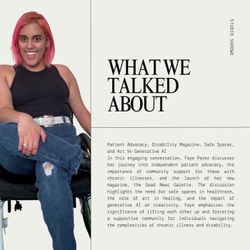
Faye: Patient Advocacy, Disability Magazine, Safe Spaces, and Art Vs Generative AI
36:55|Faye: Patient Advocacy, Disability Magazine, Safe Spaces, and Art Vs Generative AIPatient Power & Joy: Affordable Advocacy, Safe Spaces & Why Community Beats AI Art | FayeYouTube Description (Long-Form SEO & Social Media Ready)Are you tired of navigating the broken healthcare system alone? 💔In this uplifting and essential episode, we reconnect with the incredible Faye to dive deep into Independent Patient Advocacy. This conversation is your guide to feeling heard and supported in your health journey, combining practical advocacy tips with empowering discussions on community and creativity.What We Cover & Why You Need to Listen:02:49 - Patient Power: Understanding the crucial Role of Independent Patient Advocacy and how it can literally change your health outcomes.05:57 - Healthcare Hacks: Practical strategies for Navigating the Healthcare System and avoiding medical gaslighting.11:46 - Affordable Support: Learn about The Butterfly Guild and how they are providing vital, affordable advocacy services for chronic illness patients.14:34 - Positive Vibes: Discover The Good News Gazette—a source of light and hope in the often-dark world of chronic illness. ✨22:26 - Art vs. AI: A fascinating discussion on the Importance of Real Art Over AI and the unique value of human creativity in the disability space. 🎨27:42 - Find Your Tribe: The undeniable Value of Community in the chronic illness journey and how we can build Supportive Community for All.This episode is a must-listen for chronic illness patients, caregivers, advocates, and anyone interested in healthcare reform and the powerful impact of human connection.LISTEN NOW! 👇independent patient advocacy, affordable advocacy services, butterfly guild, navigating the healthcare system, patient safe spaces, medical gaslighting, chronic illness community, chronic illness support, disability advocacy, healthcare reform, joy and community, art vs ai, human creativity, aging and authenticity, universal income for artists, chronic illness podcast, patient empowerment, good news gazette, Faye, health advocacy tips, systemic healthcare issues.#PatientAdvocacy #ChronicIllnessWarrior #SpoonieLife #AffordableAdvocacy #HealthcareHacks #MedicalGaslighting #CommunitySupport #ArtVsAI #DisabilityCommunity #HealthPodcast #FindYourTribe #SupportSmallBusiness #ChronicLife #JoyThroughArt #HealthTech #ButterflyGuild #PatientPower 💪🦋🧠💻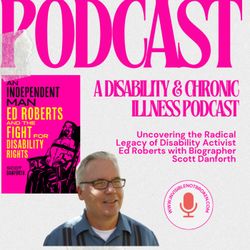
Uncovering the Radical Legacy of Disability Activist Ed Roberts with Biographer Scot Danforth
50:59|Uncovering the Radical Legacy of Disability Activist Ed Roberts with Biographer Scott DanforthKeywordsEd Roberts, disability rights, activism, biography, independence, community, technology, publishing, women in activism, accessibilityTakeawaysEd Roberts was a pivotal figure in the disability rights movement.His activism began at UC Berkeley with the Rolling Quads.The fight for disability rights is ongoing and requires constant vigilance.Family dynamics play a crucial role in fostering independence for disabled individuals.Community building is essential for effective activism.Technology can greatly enhance accessibility for disabled individuals.The Center for Independent Living was a groundbreaking initiative for disability rights.Women played a significant but often overlooked role in the disability rights movement.Writing a biography involves difficult choices about what to include or exclude.The publishing process can be challenging, especially for underrepresented stories.SummaryThis conversation explores the life and legacy of Ed Roberts, a pivotal figure in the disability rights movement. Scott Danforth, the author of a biography on Roberts, discusses the challenges and triumphs of advocating for disability rights, the importance of community and independence, and the role of technology in enhancing accessibility. The conversation also touches on the often-overlooked contributions of women in the movement and the complexities of writing a biography. Danforth shares insights from his research and the publishing process, emphasizing the need for continued advocacy and the importance of storytelling in the fight for disability rights.TitlesUnveiling Ed Roberts: A Disability Rights PioneerThe Legacy of Ed Roberts and Disability ActivismSound bites"This is not a very well-known man.""He had polio as a teenager.""He loved the technology."Chapters00:00 Introduction to Ed Roberts and His Legacy02:13 The Fight for Disability Rights09:07 Independence and Family Dynamics14:53 Building Community and Activism21:28 Technological Advancements and Accessibility26:57 Revitalizing the Center for Independent Living27:24 The Legacy of Ed Roberts and Disability Activism28:23 Unveiling the Myths of Disability Leadership30:49 The Unsung Heroes of the Disability Rights Movement31:54 Chronic Illness and the Overlooked Voices33:30 The Joys and Challenges of Writing a Biography35:21 The Process of Research and Writing36:17 Editing and Storytelling in Biography38:44 Navigating the Publishing Landscape41:25 The Journey into Disability Studies43:58 Dreams vs. Reality in Disability Advocacy46:46 The Importance of Community and Creativity48:23 Joy as Resistance in Activism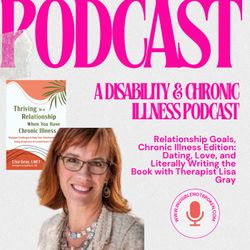
Relationship Goals, Chronic Illness Edition: Dating, Love, and Literally Writing the Book with Therapist Lisa Gray
43:45|Keywordschronic illness, relationships, conflict resolution, empathy, writing process, power imbalance, emotional management, self-help, therapy, communicationSummaryIn this conversation, Lisa Gray, a marriage and family therapist, discusses the complexities of relationships when chronic illness is involved. She shares insights on conflict resolution, the importance of empathy, and how to navigate power imbalances in relationships. Lisa also delves into her writing process, the significance of finding meaning in chronic illness, and practical tools for writing and publishing. The discussion emphasizes the need for understanding, communication, and the ability to adapt in relationships affected by chronic illness.TakeawaysConflict increases intimacy if done right.Healthy conflict means knowing your partner better.Stop fighting when you're already mad.Impulse control is key in managing conflict.Power imbalances can affect relationships with chronic illness.Empathy must go both ways in relationships.Finding meaning is crucial in the grieving process.Values can guide actions despite chronic illness.Writing can be a therapeutic process.Use tools that work for your energy levels.TitlesNavigating Relationships with Chronic IllnessThe Art of Healthy ConflictSound bites"Empathy needs to go both ways.""Intimacy is very broad.""Weighted blankets are so comforting."Chapters00:00 Introduction to Chronic Illness and Relationships02:55 Navigating Conflict in Relationships06:02 Impulse Control and Managing Emotions09:07 Power Imbalances in Relationships11:54 Empathy in Chronic Illness Relationships14:57 Core Skills for Managing Chronic Illness17:42 Finding Meaning and Values in Relationships20:55 Personal Discoveries Through Writing23:55 Building Empathy Through Curiosity24:15 Exploring Virtual Reality and Empathy25:39 Relationships and Support in Chronic Illness28:05 Intimacy and Chronic Illness30:30 The Writing Process and Tools for Writers38:58 Publishing Insights and ResourcesTranscript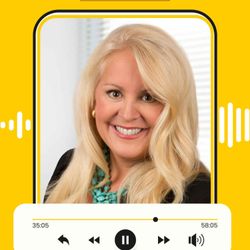
Navigating the Patient Journey with Author Brenda Snow
41:00|SummaryIn this conversation, Brenda Snow shares her personal journey as a patient diagnosed with multiple sclerosis and discusses her book, 'Diagnosed: The Essential Guide to Navigating the Patient Journey.' She emphasizes the universal experience of navigating chronic illness, the importance of grief and acceptance, and the need for strong doctor-patient relationships. Brenda also highlights the significance of maintaining one's identity while caregiving and the power of storytelling in healing. The discussion concludes with advice for aspiring writers and the importance of sharing personal narratives.Chapters00:00 Introduction to Brenda Snow and Her Journey02:49 The Universal Patient Experience06:48 Navigating Grief and Acceptance12:41 The Doctor-Patient Relationship20:42 Identity and Caregiving26:12 Finding Growth in Adversity31:56 The Power of Storytelling35:40 Advice for Aspiring Writers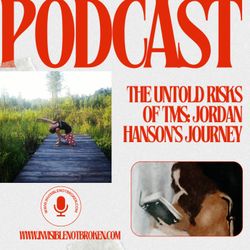
The Untold Risks of TMS: Jordan Hanson's Journey
01:00:05|KeywordsTMS, transcranial magnetic stimulation, brain injury, mental health, medical gaslighting, patient advocacy, chronic illness, technology in healthcare, self-care, mindfulnessSummaryIn this conversation, Jordan Hanson shares her personal journey with transcranial magnetic stimulation (TMS), a procedure intended to treat mental health issues. She discusses the initial excitement about the treatment, the subsequent negative effects she experienced, and the challenges of navigating the medical system. The conversation highlights the importance of patient advocacy, community support, and the role of technology in managing health. Jordan emphasizes the need for awareness and understanding of the risks associated with TMS and the importance of self-care and mindfulness in coping with chronic illness.TakeawaysTMS is a procedure that uses magnetic fields to stimulate brain activity.Jordan experienced significant negative effects from TMS, including brain injury symptoms.Medical gaslighting is a common issue faced by patients seeking help.Community support is crucial for those dealing with chronic illness.Technology, including AI, can assist in managing health and communication.Self-care and mindfulness are essential for coping with chronic illness.Advocacy is important to raise awareness about the risks of TMS.Family planning can be complicated by health issues and uncertainties.Understanding the impact of chronic illness on daily life is vital.The journey of healing is ongoing and requires patience and support.TitlesThe Hidden Risks of TMS: A Personal JourneyNavigating the Medical Maze: Jordan's TMS ExperienceSound bites"I was called headache girl for a year.""I want to share my story to help others.""I have to protect myself and my energy."Chapters00:00 Introduction to TMS and Jordan's Journey01:13 Understanding the Impact of TMS on Life01:28 Introduction and Background on TMS04:20 Understanding Trans-Cranial Magnetic Stimulation (TMS)07:23 The Experience of TMS Treatment10:20 The Impact of TMS on Daily Life13:09 Medical Gaslighting and Patient Advocacy16:13 The Journey to Recovery and Diagnosis19:14 Community Support and Sharing Stories22:18 The Decision to Create a Documentary25:13 Advocacy and Future Goals36:11 The Need for Scientific Understanding in TMS40:42 Coping with Chronic Illness and Disability44:52 Navigating Family Planning Amidst Uncertainty52:54 Leveraging Technology for Brain Injury Support59:42 Personal Growth Through Adversity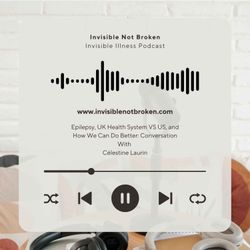
Epilepsy, UK Health System VS US, and How We Can Do Better: Conversation With Célestine Laurin
01:20:40|Epilepsy, UK Health System VS US, and How We Can Do Better: Conversation With Célestine LaurinSummaryIn this conversation, the speakers delve into the complexities of living with epilepsy and chronic illness, particularly focusing on the experiences of children and young adults. They discuss the challenges of diagnosis, the importance of support from family and friends, and the role of therapy in managing mental health. The conversation also touches on the stigma surrounding chronic illness, the impact of bullying, and practical advice for managing seizures and advocating for oneself in educational and social settings. Additionally, they explore how epilepsy is represented in the media and the need for better understanding and communication around the condition. This conversation delves into the complexities of living with epilepsy, particularly focusing on the challenges faced by women regarding medication and pregnancy. The speakers share personal experiences with the impact of epilepsy on their lives, careers, and the healthcare system. They discuss the stigma surrounding chronic illness, the importance of open communication with clients in business, and the differences in healthcare systems across countries. The conversation highlights the need for greater awareness and understanding of disability and chronic illness. In this conversation, the speakers discuss the challenges faced by individuals with disabilities, the impact of overprotection on children, and the need for inclusive spaces and universal design. They explore the healthcare systems in different countries, highlighting the disparities in access and affordability. The conversation emphasizes the importance of disability advocacy in health policy and the need for a more inclusive approach to legislation that considers the needs of all individuals, particularly those with chronic illnesses.Keywordsepilepsy, chronic illness, mental health, therapy, support, bullying, childhood illness, accommodations, media representation, epilepsy, medication, women’s health, chronic illness, disability, healthcare, personal stories, photography, career choices, mental health, disability, healthcare, universal design, overprotection, advocacy, inclusivity, chronic illness, education, mental health, accessibility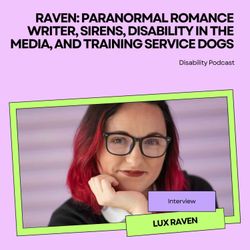
Raven: Paranormal Romance Writer, Sirens, Disability in the Media, and Training Service Dogs
52:33|Chapters00:00 Introduction to Romance Writing and Disability05:49 Life Changes During the Pandemic11:53 Writing Romance with Chronic Illness17:55 Representation of Disability in Romance24:35 The Viral Success of a Romance Novel31:07 Writing as a Form of Self-Discovery36:06 Navigating Writing with Disabilities49:59 The Journey of Training a Service DogSummaryIn this conversation, the speakers delve into the intersection of romance writing and disability representation, particularly focusing on the experiences of chronically ill individuals. They discuss the impact of the pandemic on their lives, the process of writing romance novels that feature disabled characters, and the importance of authentic representation in literature. The conversation also touches on the viral success of one speaker's romance novel, the emotional journey of writing, and the practical challenges of writing with disabilities. Additionally, they explore the journey of training a service dog and how it has positively influenced their lives.TakeawaysThe pandemic led to significant life changes and new diagnoses.Writing romance novels became a creative outlet during difficult times.There is a need for authentic representation of disabled characters in romance.Readers appreciate seeing themselves reflected in literature.The success of a romance novel can be validating for writers.Writing can be a form of self-discovery and healing.Navigating the writing process with disabilities requires adaptation and support.Service dogs can provide emotional and physical support for their owners.Community and connection are vital for those with chronic illnesses.The journey of self-publishing can be empowering despite challenges.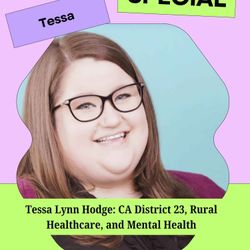
Tessa Lynn Hodge: CA District 23, Rural Healthcare, and Mental Health
53:55|SummaryIn this conversation, Tessa Lynn Hodge discusses her journey from being a licensed clinical social worker to running for office in District 23. She emphasizes the importance of community engagement, healthcare reform, and the need for authenticity in politics. Tessa shares her experiences and insights on the challenges faced by her community, particularly in rural areas, and highlights the significance of mental health accessibility and telehealth. Her campaign focuses on putting people over party and advocating for grassroots funding to ensure real change.Keywordsdisability, politics, healthcare, community, mental health, grassroots, Tessa Lynn Hodge, election, advocacy, social work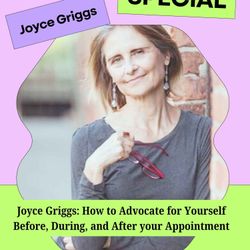
Joyce Griggs: How to Advocate for Yourself Before, During, and After your Appointment
50:25|Keywordshealth advocacy, patient empowerment, healthcare system, self-advocacy, doctor visits, healthcare resources, United States of Healthcare, patient stories, healthcare challenges, AI in healthcareSummaryIn this conversation, Joyce Griggs shares her journey into health advocacy, highlighting the challenges faced by patients in navigating the healthcare system. She discusses the importance of self-advocacy, preparing for doctor visits, and managing the dynamics between patients and healthcare providers. Joyce emphasizes the need for personalized care and the role of technology, including AI, in shaping the future of healthcare. The discussion also touches on the systemic issues within the healthcare system and the importance of community support and resources for patients.TakeawaysAdvocacy is crucial for navigating the healthcare system.Patients often face significant challenges in getting proper care.Self-advocacy is an essential skill for all patients.Preparing for doctor visits can improve outcomes.Emotional management is key before healthcare appointments.Bias exists in healthcare, affecting patient treatment.Community support can empower patients in their advocacy efforts.AI has potential benefits and risks in healthcare decision-making.Personalized care is necessary for effective treatment.Understanding insurance processes can help patients advocate for themselves.TitlesNavigating the Healthcare Maze: A Journey of AdvocacyEmpowering Patients: The Role of Self-AdvocacySound bites"We need to be our own advocates.""We are the experts of ourselves.""Personalized care is essential."Chapters00:00 Introduction to Health Advocacy02:54 Personal Journey into Healthcare Advocacy05:53 Navigating the Healthcare System08:25 Building the United States of Healthcare11:34 Resources for Health Advocacy14:23 Preparing for Doctor Visits17:07 Managing Emotions in Healthcare19:48 Interviewing Healthcare Providers22:49 Addressing Systemic Issues in Healthcare28:02 Navigating Healthcare Access Challenges30:38 Addressing Power Imbalances in Healthcare34:26 The Impact of Bias in Medical Treatment35:22 Evolving Perspectives in Medicine37:23 Utilizing Technology for Patient Advocacy42:04 Building Community and Support46:51 Envisioning a Better Healthcare System50:20 end cap.mp4